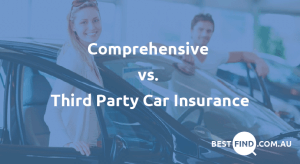How to choose a car insurance in Australia
Planning for a rainy day is important, and part of that includes having the right car insurance. After all, a wrecked car shouldn’t mean a wrecked budget. So, whether you need coverage for your dream car or the precursor to your dream car, here’s what you need to know when choosing a car insurance that’s best for you.
Which car insurance options are available?
Compulsory Third Party Insurance
CTP, also known as green slip insurance, is a bare-bones option, and as the name suggests, it’s mandatory for all registered vehicles. It provides compensation for any people you kill or injure in a car accident. In Australia, the specific details associated with your CTP insurance may vary from state to state.
For instance, CTP is an inbuilt feature of car registrations in most states. However, you have to purchase it separately if you’re in NSW. Factors like fault, liability, and requirements for vehicle safety also vary between states. However, CTP generally doesn’t cover vehicle theft and damage.
Third Party Property Insurance
TPP is an optional step-up from CTP and one of the cheaper insurance policies available to car owners. TPP additionally provides compensation for any damage you cause to other people’s vehicles or property. Your own vehicle is generally not included in the deal. But some insurers may offer limited cover if you’re in an accident where an uninsured driver is at fault.
Third Party Property, Fire and Theft Insurance
This is simply Third Party Property Insurance with added fire and theft coverage. The extra coverage comes at an additional cost, but remember, things like damage from vandalism are still not included.
Comprehensive Vehicle Insurance
Comprehensive insurance covers everything that’s covered by other types of policies, plus more. For instance, it provides compensation for damage to your vehicle, whether or not it’s your fault. The specifics of what’s included in the policy depend on the insurer. For instance, some policies don’t cover your car’s contents.
Other policies offer options with bells and whistles like roadside assistance and car hire, so it pays to shop around. While it’s true that comprehensive insurance is the most expensive car insurance, the extra value you get is generally well worth the monthly price tag.
In any case, here’s a quick outline of the different vehicle insurance options as outlined above:
| Compulsory Third Party Insurance |
Third Party Property Insurance |
Third Party Property, Fire and Theft Insurance |
Comprehensive Insurance |
- Compensation for people injured or killed in an accident when you’re at fault.
|
- Compensation for people injured or killed in an accident when you’re at fault.
- Damage to other vehicles and people’s property when you’re at fault.
|
- Compensation for people injured or killed in an accident when you’re at fault.
- Damage to other vehicles and people’s property when you’re at fault.
- Car damage from fire.
- Car theft and associated damages.
|
- Compensation for people injured or killed in an accident when you’re at fault.
- Damage to other vehicles and people’s property when you’re at fault.
- Car damage from fire, flooding, hail, storms, etc.
- Car theft.
- Damage to your car, whether or not it’s your fault.
- Damage to your car from vandalism.
- Replacement with a new car if the existing one is a write-off (depends on the policy).
|
Factors to consider when choosing a car insurance
How much coverage you need
This depends on the car’s value and your overall financial circumstances. For instance, comprehensive vehicle insurance may not be worth it if you’re currently driving a cheaper car. On the other hand, it’s a requirement of secured car loans. In most cases, any policy that’s a step above Compulsory Thirty Party Insurance is a safer bet.
Therefore, when buying a car, it’s important to keep coverage in mind. Things like the car model, its appeal, or even colour can affect the type of insurance you’ll need.
Market value vs. agreed value
If you want coverage for your vehicle, you’re looking at either fire and theft insurance or comprehensive insurance. Insuring your car for an agreed value means you’ll receive a specific amount if the vehicle is a write-off. But if you insure the car for market value, you get whatever amount equals its value when the accident occurs.
Excess and limits
The excess is the amount you have to pay to settle your claim. While a higher excess results in a low premium, it also means paying significantly more per claim. Also, consider the limit, which is the maximum amount the insurer is willing to pay per covered claim.
Discounts
Vehicle insurance typically includes all sorts of discounts. These include:
- Safe driver bonuses or no claims discounts
- Loyalty discounts
- Discounts for installing car safety features, such as an anti-theft system or alarm
- Discounts for insuring multiple cars with the same company
- Paid in full discounts – when you make a lump sum payment for a year’s worth of premiums
- Discounts for online purchases
- Discounts for limiting the number of nominated drivers on your policy
Car insurance premiums
An affordable premium rate is always a prerequisite when choosing car insurance. Generally, your premium is affected by factors like your age, credit score, driving history, state of residence, and the car you drive. Still, you’ll find that different insurers may provide you with quoted rates that are significantly different. That’s why shopping around and getting at least three quotes before settling is a big deal. In any case, you can also make your premiums more affordable by:
- Keeping your driving history clean
- Driving the car less often
- Insuring for market value instead of agreed value
- Restricting the number of nominated drivers on your policy
- Choosing a higher excess (not always recommended)
- Shopping for discounts and complying with requirements that qualify you for a discount
Additional coverages
Check if you can get optional extras like:
- Roadside assistance
- Cover for related legal costs
- Windscreen protection
- Protected no claim bonus
- Car hire
- Additional drivers on your policy
The insurer’s reputation
Insurers have different terms and conditions attached to their products. It’s best to find a company that matches your circumstances and offers better coverage for the type of car you drive.
Also, look for a car insurance company with a good reputation built on great customer service and fast responses when settling and filing claims. Checking online reviews from genuine customers can help you in this regard.
Bottom line
Choosing a car insurance with adequate and reliable insurance is essential for any car owner with an ounce of self preservation and the desire for a good night’s sleep. Whether you’re new to the scene or simply looking for a better deal when renewing, it’s essential to do your due diligence, so you can find a package that suits your budget, preferences, and needs.
Latest posts

What You Should Know: Comprehensive vs. Third Party Car Insurance.
28.07.2020

What You Need to get a Mortgage in Australia
11.04.2019

What is a term deposit and how does it work?
04.06.2018
